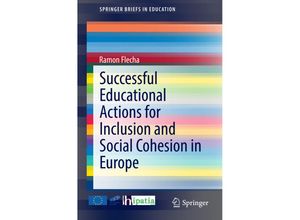This monograph analyses and describes successful educational actions with a specific focus on
vulnerable groups (i.e. youth migrants cultural groups e.g. Roma women and people with
disabilities). Concrete data that shows success in school performance in subject matters such
as math or language will be provided as well as children teachers and families accounts of
the impact of this success. Alongside there is an analysis of the relationship between these
children's educational performance with their inclusion or exclusion from different areas of
society (i.e. housing health employment and social and political participation). Many
studies have already diagnosed and described the causes of educational and social exclusion of
these vulnerable groups. This monograph however provides solutions that is actions for
success identified through the INCLUD-ED project thus providing both contrasted data and
solid theoretical background and development. Some examples of these actions are interactive
groups (or heterogeneous grouping in the classroom with reorganisation of human resources)
extension of the learning time homework clubs tutored libraries family and community
educative participation family education or dialogic literary gatherings. All these actions
have been defined as successful educational actions which mean that they lead to both
efficiency and equity. Finally recommendations for policy and practice are included and
discussed.

